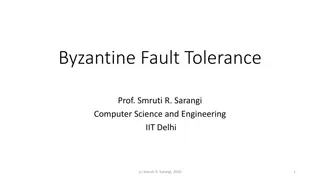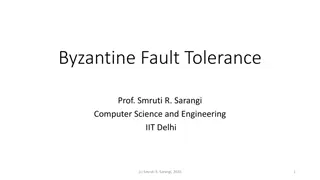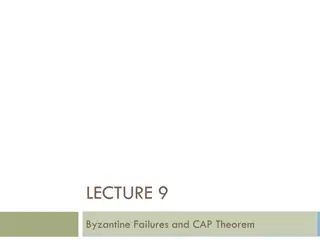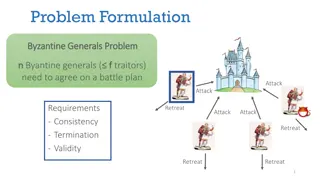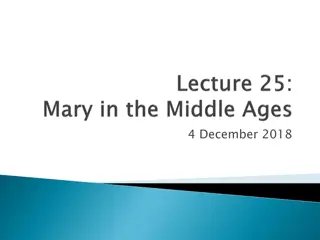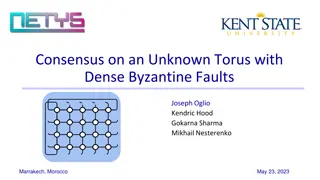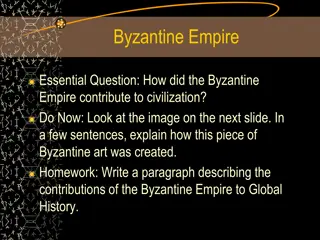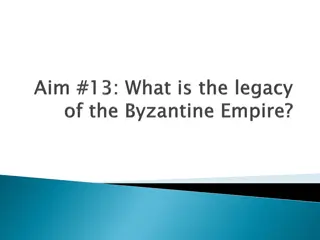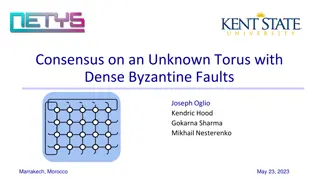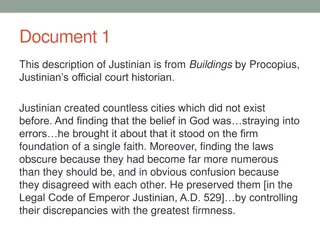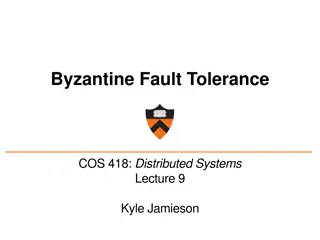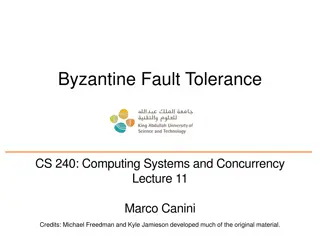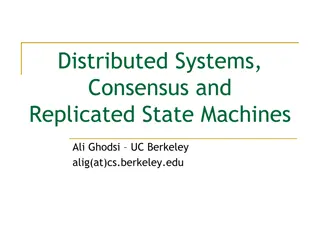Germanic Tribes and Languages in History
Delve into the ancient Germanic tribes and languages, their territories, movements during the Migration Period, surviving languages, writing systems, and encounters with prominent historical figures like Roman generals. Learn about the earliest mentions of Germans by Greek travelers and astronomers,
5 views • 35 slides
Overview of Distributed Systems: Characteristics, Classification, Computation, Communication, and Fault Models
Characterizing Distributed Systems: Multiple autonomous computers with CPUs, memory, storage, and I/O paths, interconnected geographically, shared state, global invariants. Classifying Distributed Systems: Based on synchrony, communication medium, fault models like crash and Byzantine failures. Comp
11 views • 126 slides
Byzantine Fault Tolerance in Distributed Systems
Byzantine fault tolerance is crucial in ensuring the reliability of distributed systems, especially in the presence of malicious nodes. This concept deals with normal faults, crash faults, and the challenging Byzantine faults, where nodes can exhibit deceptive behaviors. The Byzantine Generals Probl
0 views • 29 slides
Federal Audit Executive Council FY2021 Data Act Working Group Overview
The Federal Audit Executive Council's Data Act Working Group assists Inspector Generals in meeting oversight requirements. Established in 2015, it includes a Common Methodology Team and a Governance Team to ensure compliance. The teams work on soliciting feedback, developing audit guides, conducting
0 views • 22 slides
Implications of IG Empowerment Act and Paperwork Reduction Act
The IG Empowerment Act provides beneficial provisions for Inspector Generals (IGs) such as exemptions from certain acts, including the Computer Matching Act and Paperwork Reduction Act. The Paperwork Reduction Act requires federal agencies, including IGs, to obtain OMB clearance before conducting su
1 views • 25 slides
Byzantine Fault Tolerance: A Comprehensive Overview
Byzantine Fault Tolerance (BFT) is a critical concept in computer science, addressing faults in distributed systems. This summary covers the types of faults (normal, crash, Byzantine), implications of Byzantine faults, Byzantine Generals Problem, impossibility results, and the complexity of solving
3 views • 29 slides
Round-Efficient Byzantine Broadcast Under Strongly Adaptive and Majority Corruptions
This paper discusses a round-efficient Byzantine broadcast protocol that addresses strong adaptive adversaries and majority corruptions. The protocol involves unique and unbreakable peer signatures, committees for message verification, and time-locking mechanisms to prevent message tampering. By uti
3 views • 5 slides
Economic Models of Consensus on Distributed Ledgers in Blockchain Technology
This study delves into Byzantine Fault Tolerance (BFT) protocols in the realm of distributed ledgers, exploring the complexities of achieving consensus in trusted adversarial environments. The research examines the classic problem in computer science where distributed nodes communicate to reach agre
1 views • 34 slides
Byzantine Failures and CAP Theorem Overview
Byzantine failures refer to arbitrary patterns of failures where nodes exhibit inconsistent behavior. This lecture discusses Byzantine agreement and the challenges in reaching consensus with faulty nodes. It explores the minimum number of processes needed for consensus and extends the concepts to ge
1 views • 32 slides
Distributed Consensus Models in Blockchain Networks
Economic and technical aspects of Byzantine Fault Tolerance (BFT) protocols for achieving consensus in distributed ledger systems are explored. The discussion delves into the challenges of maintaining trust in adversarial environments and the strategies employed by non-Byzantine nodes to mitigate un
0 views • 34 slides
Geometric Routing Concepts and Byzantine Fault Tolerance
Geometric Routing enables routing without overhead, where each node knows its global coordinates and forwards messages based on proximity to the destination. Byzantine Faults pose challenges with arbitrary node behavior, but a Byzantine-Robust Geometric Routing algorithm addresses this in a 3-connec
3 views • 33 slides
Exact Byzantine Consensus on Undirected Graphs: Local Broadcast Model
This research focuses on achieving exact Byzantine consensus on undirected graphs under the local broadcast model, where communication is synchronous with known underlying graphs. The model reduces the power of Byzantine nodes and imposes connectivity requirements. The algorithm involves flooding va
0 views • 7 slides
Byzantine Generals Problem in Distributed Systems
The Byzantine Generals Problem addresses how a group of generals, some of whom may be traitors, can reach a consensus on a battle plan while ensuring consistency, termination, and validity. Various protocols are explored to handle challenges such as faulty leaders, consistency violations, and cheati
0 views • 23 slides
The Impact of Music During the Civil War
Music played a significant role during the Civil War, with soldiers singing and carrying song books, creating a sense of camaraderie. Over 10,000 pieces of music were published by the end of the war, providing comfort and hope to those on the front lines and those at home waiting for their loved one
1 views • 12 slides
Influence of Mary in Byzantine and Western Art Through the Ages
The influence of Mary, the mother of Jesus, in Byzantine and Western art is explored through various historical events and artworks. From early visions of Mary to the declaration of Feast of Dormition, the devotion to Mary has shaped artistic representations and church dedications. Iconic cathedrals
0 views • 18 slides
Byzantine Faults and Consensus on Unknown Torus
The discussion revolves around achieving consensus in the presence of dense Byzantine faults on an unknown torus. Various challenges and impossibility theorems are explored, highlighting the complexities of reaching an agreement in such fault-prone environments. The content delves into the limitatio
1 views • 23 slides
The Stab in the Back Theory: Rise of the Nazis After WWI
The Stab in the Back Theory originated in Germany post-WWI, where people felt betrayed by politicians and generals for surrendering prematurely. Hitler used this theory to blame Socialists, Communists, and Jews, gaining followers by offering someone to blame for Germany's defeat.
0 views • 8 slides
Byzantine Fault Tolerance: Protocols, Forensics, and Research
Explore the realm of Byzantine fault tolerance through protocols like State Machine Replication and HotStuff, discussing safety, liveness, forensic support, and the impact of Byzantine faults. Dive into decades of research on achieving fault tolerance and examining forensic support in the face of By
1 views • 24 slides
The Contributions of the Byzantine Empire to Civilization
The Byzantine Empire made significant contributions to civilization through art, law, religion, and centralization of government. The empire's legacy includes the preservation of Roman laws, promotion of Christianity, accumulation of church wealth, and establishment of Constantinople as a key center
0 views • 22 slides
Optimally Resilient Asynchronous Multi-Valued Byzantine Agreement
Exploring the challenges and solutions in achieving optimally resilient asynchronous multi-valued Byzantine agreement protocols. This work presents a novel construction meeting key requirements and delves into round-preserving parallel composition of agreements, shedding light on probabilistic termi
0 views • 19 slides
The Byzantine Empire: Society, Achievements, and Decline
The Byzantine Empire, established in 527 A.C, was marked by religious conflicts and military advancements. The society was patriarchal, centered around Christianity, and had a hierarchical structure. The empire made significant progress in weaponry and trade, although frequent battles ensued. Despit
0 views • 7 slides
Byzantine Empire and Eastern Orthodox Church Overview
The Byzantine Empire, also known as the Eastern Roman Empire, flourished from 330 CE to 1453 CE under Greek rule. It played a significant role in trade, politics, and culture during the Post-Classical Era, connecting trade routes and reconquering the West under rulers like Justinian. However, challe
0 views • 9 slides
Secure Append-Only Memory for Byzantine Fault Tolerance
Explore the concept of Attested Append-Only Memory (A2M) in distributed systems, which ensures adversaries adhere to their commitments. Learn about safety and liveness goals, Practical Byzantine Fault Tolerance (PBFT), equivocation issues, and the A2M log and interface for secure data management. Di
0 views • 34 slides
Communication Complexity in Byzantine Agreement Research
The presentation discusses communication complexity in Byzantine Agreement, emphasizing a lower bound of (f/2) when After the Fact removal is considered. It explores two major contributions - the communication lower bound in randomized protocols and near-optimal subquadratic Byzantine Agreement. The
0 views • 9 slides
History of the Byzantine Empire
Justinian's massive building projects, corrupt rulers after him, the impact of the Bubonic Plague, religious conflicts, outside invasions, and the preservation of knowledge by the Byzantine Empire. The Empire's influence on Eastern Europe, Central Asia, and the spread of Eastern Orthodox Church and
0 views • 6 slides
Shiloh Generals Track Club
Hosting a Parent/Student/Coaches Meeting on December 11th, 2018. Learn about the club's history, practice schedule, expectations, upcoming events, and more. Details on coaches, dues, uniforms, and how to get involved are provided.
0 views • 20 slides
NEPOLEON BONAPARTE
Napoleon Bonaparte, a prominent figure in history, was a general during the French Revolution, serving as First Consul and Emperor of France. Known for his military tactics and the Napoleonic Code, he formed alliances and led armies to victory in several battles. Born in Corsica, his legacy as one o
0 views • 18 slides
Consensus and Fault Tolerance on an Unknown Torus with Dense Byzantine Faults
This content discusses achieving consensus and fault tolerance on an unknown torus with dense Byzantine faults, exploring scenarios of sparse and dense faults in a network setting. It delves into the challenges of consensus algorithms on toroidal networks, highlighting the limits and complexities th
0 views • 23 slides
Investigating Justinian's Legacy
In this collection of historical documents, the contrasting perspectives on Emperor Justinian of the Byzantine Empire are explored. From his contributions to governance and law to his personal characteristics and divine-like authority, the complexities of Justinian's rule are examined through the wr
0 views • 13 slides
Byzantine Generals in the Permissionless Setting
The challenges and solutions faced by Byzantine generals in the permissionless setting, including concepts like Byzantine Broadcast, decentralized protocols, and defense against mobile adversaries. Delve into the theorems and definitions that shape this fascinating field of study.
0 views • 17 slides
Blockchain Protocol Solida: Reconfigurable Byzantine Consensus
Solida is a blockchain protocol based on reconfigurable Byzantine consensus, developed by Ling Ren in collaboration with Ittai Abraham, Dahlia Malkhi, Kartik Nayak, and Alexander Spiegelman at VMware Research. The protocol provides insights into Bitcoin, mining, double spending, permissionless conse
0 views • 19 slides
Solida: A Blockchain Protocol Based on Reconfigurable Byzantine Consensus
Dive into the innovative blockchain protocol Solida, developed through collaborative research at VMware. Explore the intricacies of blockchain technology with a focus on reconfigurable Byzantine consensus, incorporating concepts like mining, double spending, and permissionless consensus. Uncover the
0 views • 14 slides
Asynchronous Byzantine Agreement in Incomplete Networks
This discussion delves into the concept of Asynchronous Byzantine Agreement in the context of incomplete networks, analyzing the challenges and solutions proposed by Ye Wang and Roger Wattenhofer from ETH Zurich's Distributed Computing department. The images and scenarios presented shed light on the
0 views • 28 slides
Byzantine Fault Tolerance in Distributed Systems Lecture
Explore Byzantine fault tolerance, state machine replication, and practical algorithms like Paxos and Raft in distributed systems. Learn about handling arbitrary failures, providing high reliability, and case studies on fault-tolerant systems like Boeing 777 fly-by-wire controls.
0 views • 41 slides
Practical Byzantine Agreement in Distributed Systems: Exploring Protocols and Adversarial Scenarios
Delve into the dynamics of achieving Byzantine agreement in distributed systems through protocol design, adversarial scenarios, and the use of randomized algorithms. Understand the challenges posed by untrusted players and the importance of public ledgers and digital currencies.
0 views • 34 slides
7th Century Historical Overview: Rise of Islam and Byzantine-Persian War
Explore the historical landscape of the 7th century, witnessing the rise of Islam amidst Western and Eastern opposition. Dive into the desolate state of Rome, the political dynamics between the Byzantine Empire and the Arab world, and the consequences of the Persian-Byzantine War. Uncover the comple
1 views • 24 slides
Byzantine Fault Tolerance & State Machine Replication Overview
Learn about Byzantine fault tolerance in computing systems, the challenges of tolerating arbitrary failures, and the importance of providing state machine replication for reliable services. Explore practical algorithms and case studies for mitigating Byzantine faults in critical systems.
0 views • 41 slides
Distributed Systems, Consensus & Replicated State Machines Overview
Explore the challenges and concepts in distributed systems, including the Two Generals Problem, consensus, and replicated state machines. Learn about key protocols and the limitations of achieving consensus in distributed environments.
0 views • 28 slides
Understanding Byzantine Fault Tolerance and Generals' Problem
Delve into Byzantine Fault Tolerance, General's Problem, and Impossibility Results in distributed systems, exploring challenges with traitors and disloyal commanders.
0 views • 29 slides
Survival Secrets of the Byzantine Empire: New Rome's Legacy
Discover the enduring strength of the Byzantine Empire, its ability to last 1000 years, and the strategic advantages of Constantinople as a major city. Explore why Justinian was known as "The Emperor Who Never Sleeps" and the factors contributing to the empire's longevity.
0 views • 16 slides


